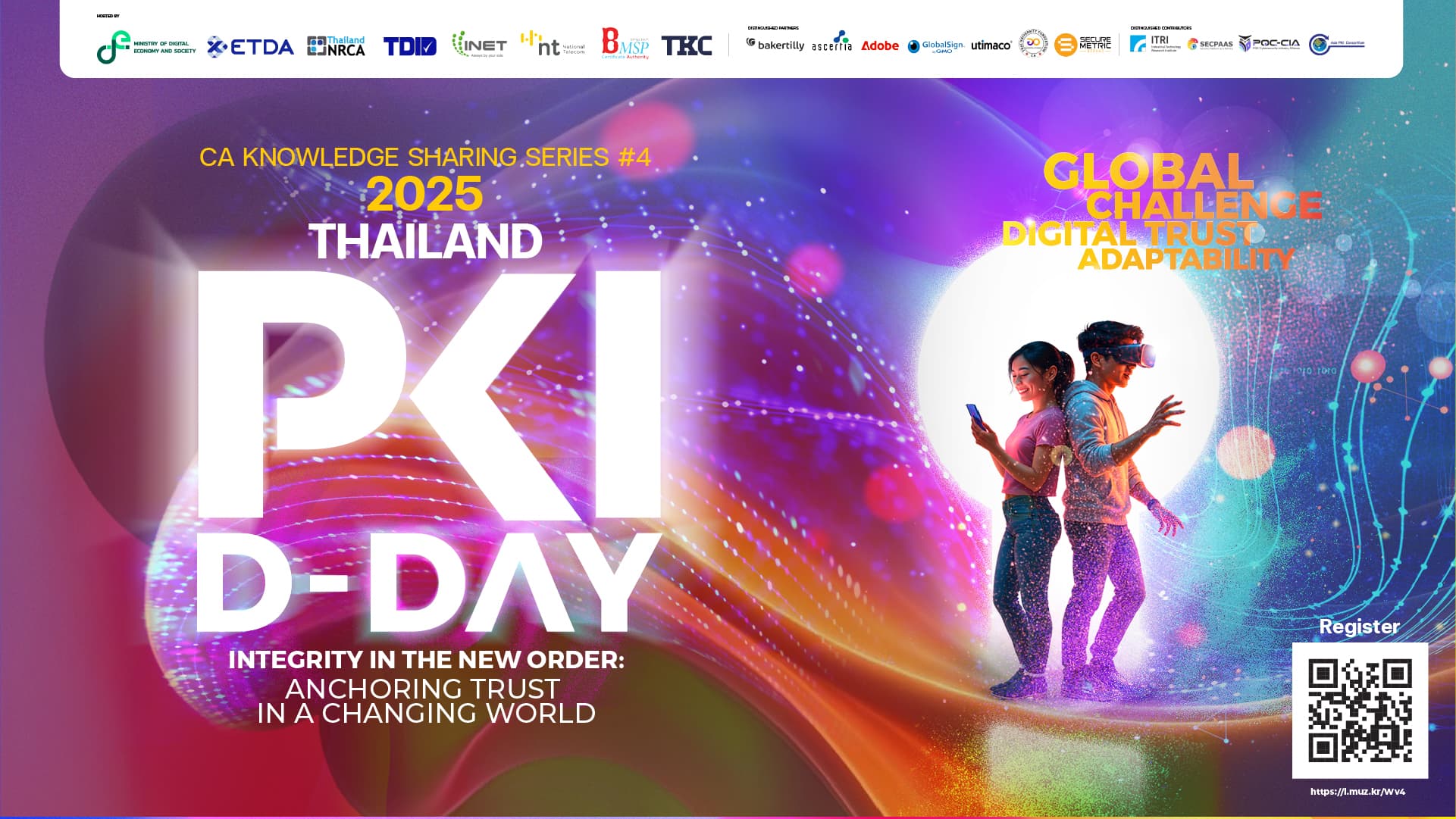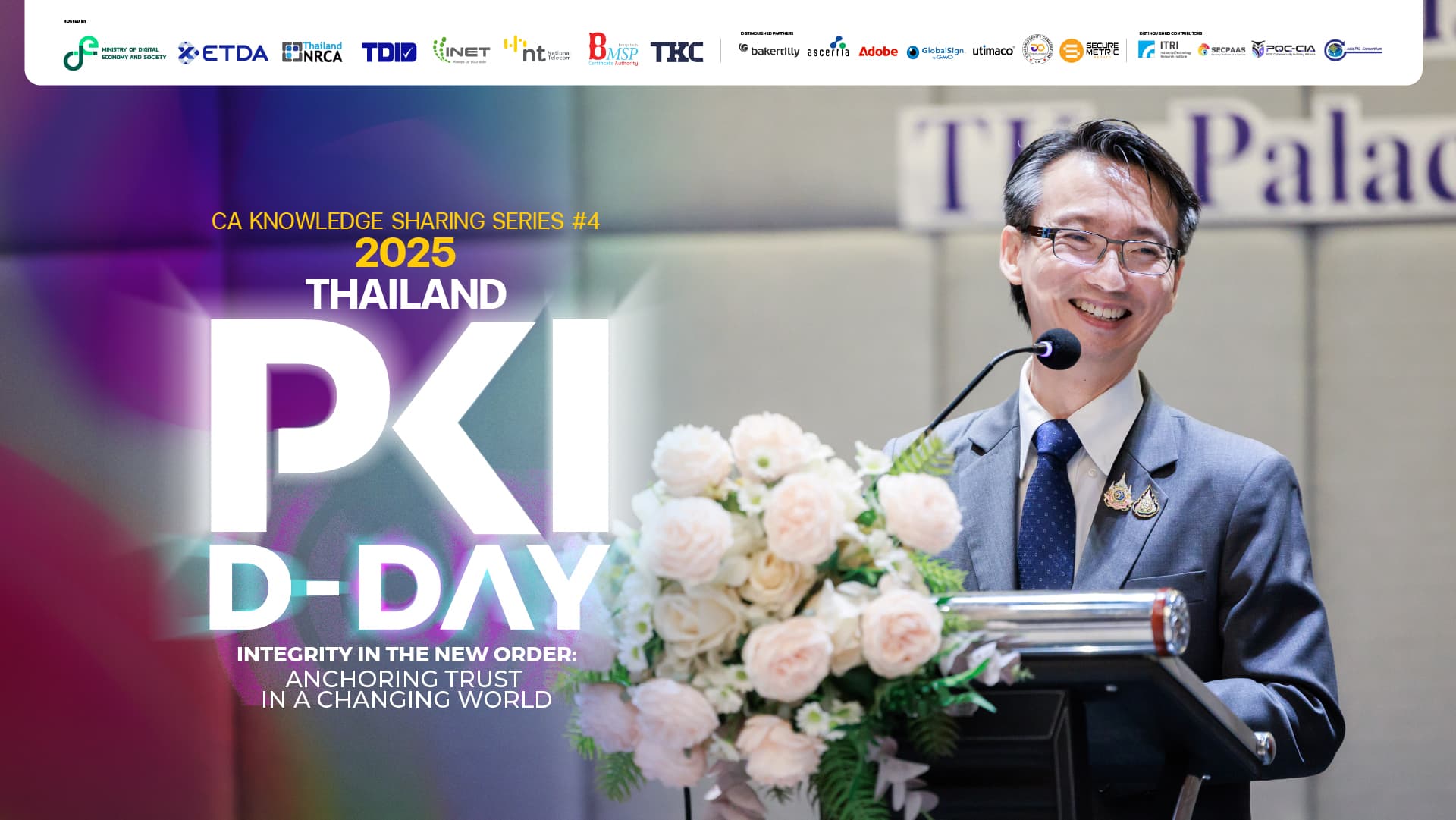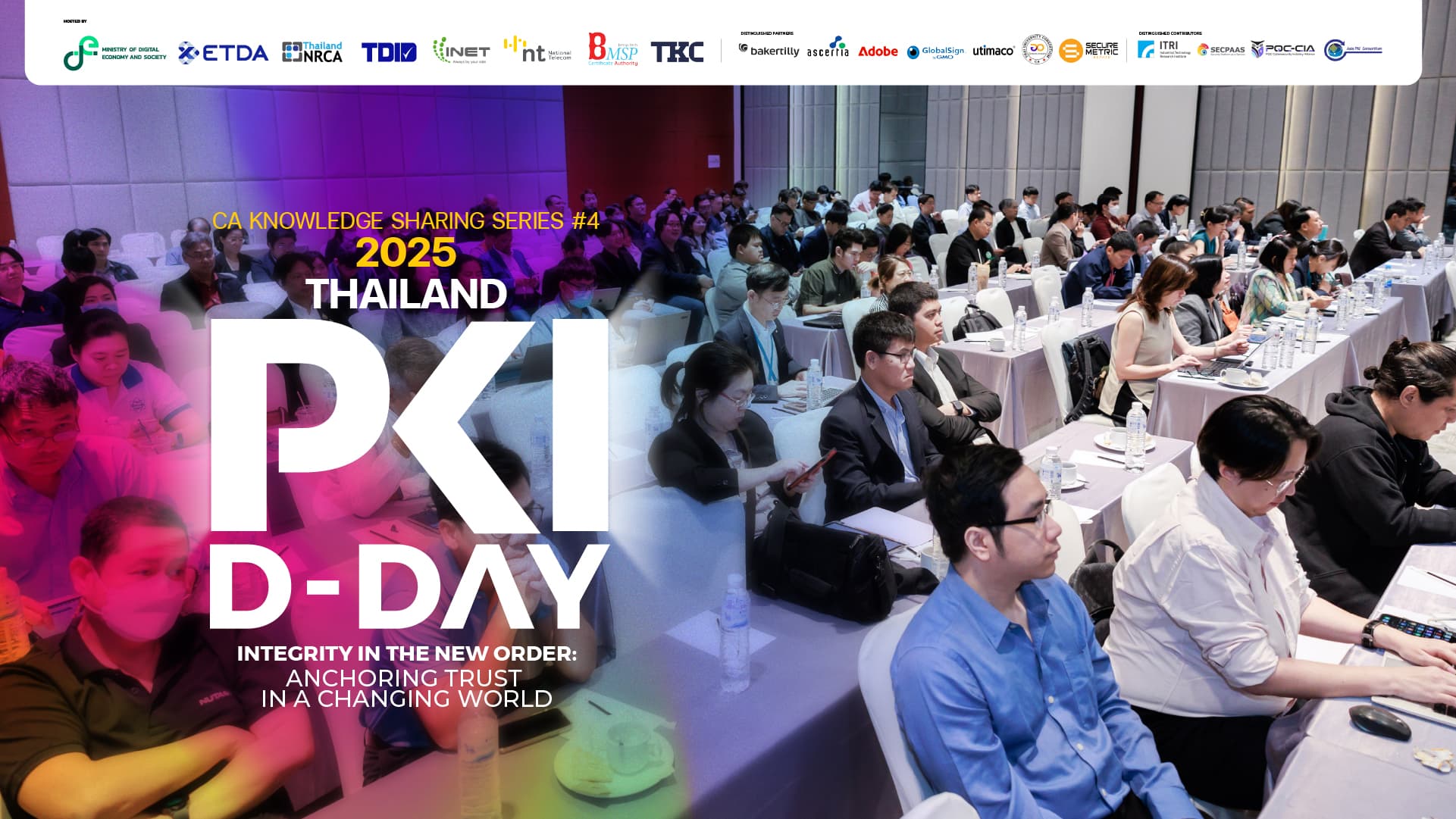.aspx)
NRCA
- 08 ส.ค. 68
-
 2275
2275
-
Thailand NRCA Hosts “Thailand PKI D-Day 2025” – Elevating Thailand’s Digital Trust to the Global Stage, Advancing Electronic Certification in the Era of AI and Quantum Computing
On August 5, 2025, the Electronic Transactions Development Agency (ETDA), through the National Root Certification Authority of Thailand (Thailand NRCA), hosted the grand event “Thailand PKI D-Day 2025 | A Good Day with… PKI” at TK Palace Hotel & Convention. The event aimed to share the latest knowledge on Digital Certificates and Public Key Infrastructure (PKI), while advancing Thailand’s digital security standards to keep pace with global developments.

Dr. Chaichana Mitrpant, Executive Director of ETDA, presided over the opening ceremony and introduced the Thailand NRCA initiative, established in 2009 to operate Root Programs that meet security requirements for both Single Purpose Certificate Authorities (CAs) and Extended Key Usages, including NRCA G1, NRCA G2: TLS/SSL, and NRCA G3: Document Signing.
Thailand NRCA certificates are WebTrust-certified for CA operations, TLS services, and network security, and are recognized in major global trust stores such as Microsoft, Adobe AATL, and Foxit FATL. This recognition reflects the project’s credibility and capability, which have supported Thailand’s information systems with confidence for over 15 years. Dr. Chaichana emphasized NRCA’s vital role as the “foundation” of the nation’s cybersecurity infrastructure, noting:
“In today’s digital era—where transactions, services, and communications increasingly take place online—reliable infrastructure like PKI and Digital Certificates are essential to ensure that ‘trust’ and ‘security’ advance hand in hand. Our future goal is to expand capabilities to serve the government, private sector, and citizens, especially as technologies like AI, IoT, and Digital ID become central to economic systems and public services. NRCA is ready to be the ‘Trust Anchor’ that all sectors can rely on in the long term.”
The event brought together domestic and international experts to share insights on current cybersecurity trends. Among them were Mr. Wei–Chung Hwang, Deputy General Director of Industrial Technology Research Institute (ITRI), and Mr. Wei-Bin Lee, Convener of the Post-Quantum Cryptography Cybersecurity Industry Alliance (PQC-CIA). They discussed the evolving cybersecurity landscape in the AI and quantum computing era, pointing out that these technologies can be both a “shield” and a “threat” to digital systems—for example, the “Evil-GPT” model, which leverages AI for fraud and data breaches.
They also noted that the U.S. National Security Agency (NSA) has mandated the full adoption of post-quantum cryptographic algorithms across government agencies by 2035. However, the transition to Post-Quantum Cryptography (PQC) faces challenges, including algorithm complexity, limited budgets, and interoperability between old and new systems. They highlighted “PQC Migration Guidelines” as a proactive example to strengthen national digital security.
Mr. Lim Huck Hai, Managing Partner – Consulting, Baker Tilly Malaysia, introduced a new approach to online system security: using short-lived digital certificates valid for only 47 days, which reduces exposure to potential misuse—a proactive measure to help PKI structures stay ahead of modern threats.
From the perspective of cross-border certification, Mr. Fabio Rego, Business Solution and Compliance Manager, Ascertia Limited, shared key lessons from implementing Europe’s new eIDAS 2.0 regulation. This framework promotes the use of a Digital Identity Wallet for identity verification across Europe in both public and private sectors and expands services to include legally recognized electronic document storage and Electronic Attestation of Attributes (EAA). The regulation supports large-scale trials with over €46 million in funding and imposes strict penalties of up to €5 million or 1% of global turnover for non-compliance. Mr. Rego also suggested that this model could be adapted for Asian countries to prepare for international acceptance of digital certificates and identities.
Andrea Valle, Principal Product Manager, Document Cloud, Adobe Inc., stressed that “trust” is at the heart of digital signature systems. Adobe revealed that more than 10 billion PDFs are digitally signed each year, with 800 million signature verifications conducted monthly via Adobe Acrobat. He identified key factors for global recognition of e-signatures, including strong identity verification, secure key management, and compliance with international standards such as eIDAS and NIST. Valle also proposed integrating e-signatures with digital identity solutions to enhance security, authenticity, and confidence in all digital transactions.
On the domestic front, Dr. Kitt Tientanopajai, Assistant to the President for Digital Affairs, Khon Kaen University, presented progress on the Thai University Consortium Certification Authority (TUC-CA) project. The initiative aims to create a low-cost yet secure and legally compliant digital signature system for Thai educational institutions. To date, TUC-CA has issued over 60,000 Digital IDs across 140+ Subordinate CAs, reducing paper usage by more than 30% and supporting practical applications such as e-Transcripts, e-Receipts, and digital contract signing nationwide—demonstrating successful PKI adaptation for the education sector.
Representatives from leading Thai CAs—including Thai Digital ID Co., Ltd., Internet Thailand Public Co., Ltd., Bangkok MSP Co., Ltd., Turnkey Communication Services Public Co., Ltd., and the Thai University Consortium—joined a strategic panel discussion on advancing Thailand’s digital certificate industry to meet international standards, with the shared goal of achieving global trust and recognition.
The afternoon sessions showcased cutting-edge technologies, including the PKIMetal Meta Validator from Securemetric Technology Sdn Bhd, “Advent of Quantum Computing” from Utimaco IS Pte Ltd., PQC-enabled dongles and Hybrid FIDO2/X.509 systems from ITRI, and Verified Mark Certificate (VMC) solutions from GMO GlobalSign, aimed at boosting brand trust in digital channels.
The event concluded with a regional collaboration panel by the Asia PKI Consortium (APKIC), ETDA, and ITRI, promoting the development of an interconnected regional digital trust infrastructure.
Beyond panels and in-depth sessions, the event featured an exhibition of more than 17 booths from Thai and international organizations, showcasing the latest digital certificate and PKI technologies, tools, and concepts—offering participants hands-on learning experiences.

Thailand PKI D-Day 2025 was not merely an academic conference—it reaffirmed Thailand’s role as a hub for knowledge, innovation, and collaboration in the field of digital certificates, and marked another step forward toward a secure, trusted, and sustainable digital society.
For updates and more information, visit www.nrca.go.th or follow the ETDA Thailand Facebook page.
DOWNLOAD SLIDE
0845 - 0900 Thailand NRCA Project
0900 - 0935 How Post-Quantum Cryptography and AI Are Changing the Security Landscape
0935 - 0955 Short-Lived Certificates Are Approaching Prepare for 47-Day SSLTLS Certificates
0955 - 1030 eIDAS 2.0 - The Future of Digital Identity and Trust Services
1030 - 1100 Enabling Global Trust Digital Identity and Signatures
1100 - 1130 Public Key Infrastructure for Thai universities
1435 - 1450 The PKIMetal Meta Validator - Ensuring Compliance with TLS Baseline Requirements
14.20 - 14.35_Verified Mark Certificate _ its Process
1450 - 1505 How to prepare for the advent of Quantum Computing
1505 - 1520 PQC-Enabled Security Dongle